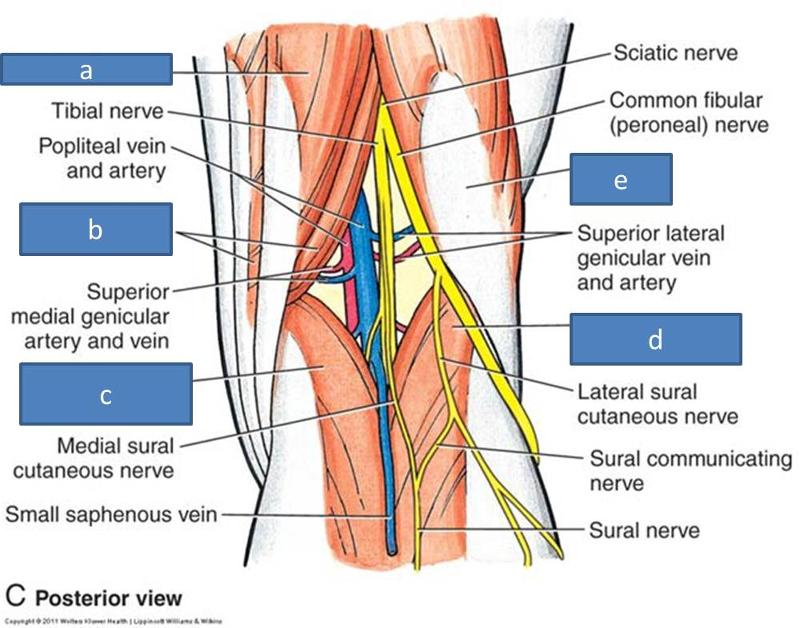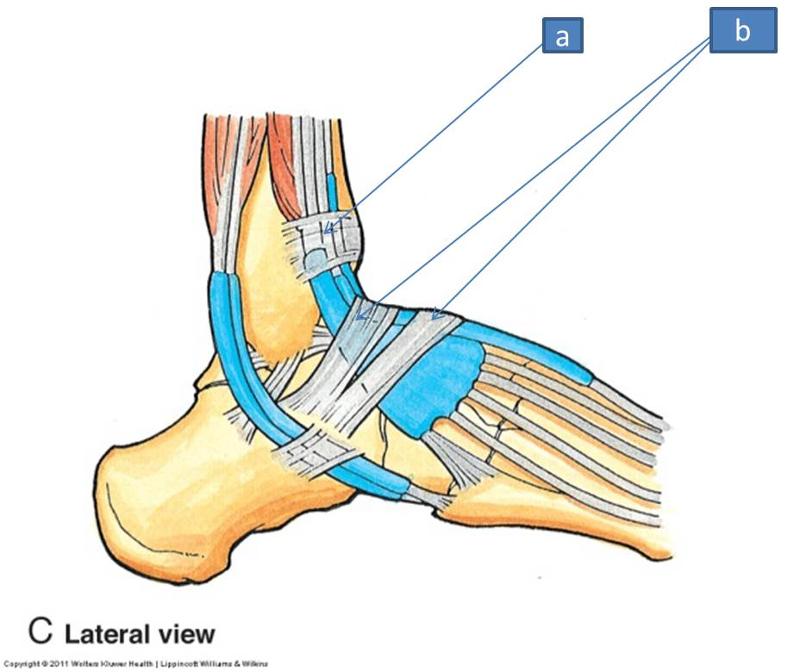Anatomy Block III- Popliteal Fossa and Leg
junction between thigh and leg, a diamond shaped space in back of the knee
what is the popliteal fossa
a. semitendinosus
b. semimembranosus
c. medial head of gastrocnemius
d. lateral head of gastrocnemius
e. biceps femoris

popliteal artery, knee flexed, palpate posteriorly for pulse
where is the popliteal pulse felt from
semimebranosus and semitendonosus
what is the upper medial border of the popliteal fossa
biceps femoris
what is the upper lateral border of the popliteal fossa
medial and lateral heads of the gastrocnemius
what are the lower medial and lateral borders of the popliteal fossa
covered with popliteal fascia, continuous with fascia latae, which contines down to the fascia of the leg
what is the popliteal fossa covered with? what is that continuous with
yes
does the fossa have a lot of fat
sometimes the end of the sciatic nerve
small saphenous vein
tibial nerve
common fibular nerve
popliteal vein
popliteal artery
what are the contents of the popliteal fossa
popliteal vein
what does the small saphenous vein drain into
superficial posterior part of the leg
what part of the leg does the small saphenous vein drain
medial part of fossa
where is the tibial nerve in the popliteal fossa
sciatic nerve
what is the tibial nerve a branch of
sciatic nerve
what is the fibular nerve a branch of
the lateral side of the fossa
where does the common fibular nerve leave the popliteal fossa
deep in the fossa, more superficial than the artery
where is the popliteal vein in the popliteal fossa
deep to popliteal vein
where is the popliteal artery in the popliteal artery
continuation of the femoral artery, gives off some arteries that supply part of the leg like the tibial arteries
where does the popliteal artery branch from and what does it give off
interosseus membrane
what is another name for the interosseus ligament
a. posterior intermuscular septum
b. anterior intermuscular septum
c. deep (crural) fascia
d. interosseus membrane

tibia medial, fibula lateral
which bone of the leg is more medial and which is more lateral
paired long bones with interosseus membranse in both (thick CT between two bones) and each bone has an interosseus border
what is the structure of the leg like
tibia
fibula
tarsal bones and other bones of the foot discussed later
what are teh bones of the leg
weight bearing bone, articulates with the femur
what is the role of the tibia? what does it articulate with
bone for ankle support, also serves as a muscle attachment place and has no femur connection
what is the role of the fibula
they are the lateral and medial prominences on their respective sides of the ankle, formed by the fibula and tibia respectively
what are the lateral and medial malleoli
CT joining tibia and fibula
what is the interosseus membrane
allows pivot among the two bones
what is the functional moving role of the interosseus membrane
divides anterior and posterior compartments
what does the interosseus membrane do structurally
deep fascia of the leg, goes tibia to tibia
what is the crural fascia
continuous superiorly with the popliteal fascia and fascia latae
what is the crural fascia continuous with
divides anterior and lateral compartments
what is the role of the anterior intermuscular septum
divides lateral from posteiror compartments
what is the role of the posterior intermuscular septum
divides anterior and posterior compartments
what is the role of the interosseus membrane structurally
muscle actions
innervation
blood supply
what do muscles in the same compartment typically share
dorsiflexion of ankle/foot (pulls toes up)
what is the shared action of muscles in the anterior compartment
lateral
where is the anterior compartment relative to the tibia
dorsiflexion and ankle inversion (rolls ankle inwards)
what is the action of the tibialis anterior
tarsal bones
where does the tibialis anterior attach?
dorsiflexion and extension of the toe
what is the action of the extensor hallucis longus
big toe
what is the extensor hallucis longus attached to distally
deep to other anterior muscles, tendon visible
where is extensor hallucis longus
dorsiflexion and helps extend toes 2-5
what is the action of the extensor digitorum longus
toes 2-5
what does the extensor digitorum longus connect with
a. tibialis anterior
b. extensor digitorum longus
c. fibularis tertius
d. extensor hallucis longus

lateral to tibialis anterior
where is the extensor digitorum longus
small muscle that wraps around lateral side
where does the fibularis tertius run
weak dorsiflexor and helps evert the ankle
what is the action of the fibularis tertius
dorsalis pedis artery
what does the anterior tibial artery become within the anterior compartment
L4-S1
what anterior rami make up the deep fibular nerve
a. anterior tibial artery
b. deep fibular nerve
c. dorsalis pedis artery

a. extensor digitorum longus
b. extensor hallucis longus
c. tibialis anterior

(Anterior Compartment Muscles)
tibialis anterior
extensor hallucis longus
extensor digitorum longus
fibularis tertius
what does the deep fibular nerve supply
anterior
what compartment is the tibialis anterior in
anterior
what compartment is the extensor hallucis longus in
anterior
what compartment is the extensor digitorum longus in
anterior
what compartment is the fibularis tertius in
everts and plantarflexes
what is the shared action of the lateral compartment
behind lateral malleolus of the fibula
where does the lateral compartment insert
fibularis longus is superficial to fibularis brevis
where are the fibularis longus and fibularis brevis relative to one another
a. fibularis longus
b. fibularis brevis

evert the foot (contract to prevent ankle inversion) and plantarflexion
what is the function of fibularis longus and fibularis brevis
posterior compartment
where does the fibular artery come from
perforating branches of the fibular artery
what does the fibular artery give off
anterior rami of L5-S2
where does the superficial fibular nerve get its innervation from
fibularis longus and fibularis brevis
what muscles does the superficial fibular nerve innervate
2 layers
what is special about the posterior compartment of the leg compared to the rest
plantarflexes
what is the shared action of the posterior compartment
L4-S3
where does the tibial nerve get innervation from
posterior tibial artery supplies this compartment
fibular artery is found in this compartment but does not supply it
what arteries are in the posterior compartment
tibial vein
what vein is in the posterior compartment
gastrocnemius
soleus
plantaris
what muscles are part of the superficial layer of the posterior compartment
a. lateral head of gastrocnemius
b. soleus

flexes knee and plantarflexes
what is the role of the gastrocnemius
has medial and lateral heads, crosses knee joint and attaches to the femur
what is interesting about the gastrocnemius
gastrocnemius, important in running/sprinting
what is the power plantarflexor in the posterior compartment
deep to gastrocnemius
where is the soleus
large flat muscle
what does the soleus look like
achilles tendon
where does the soleus use for attachment (gastrocnemius uses it also)
endurance plantarflexor as opposed to the power of the gastrocnemius
what is the function of the soleus
crosses the knee
what does the plantaris do that is interesting structurally
between gastrocnemius and soleus
where is the tendon for the plantaris go?
weak plantarflexor, may be a proprioceptor
what is the role of plantaris
plantaris
which muscle has a long tendon that is called the medical student nerve
achilles tendon
what is another name for the calcaneal tendon
calcaneal tendon/achilles tendon

plantarflex, minus one
what do the muscles in the deep posterior layer do
a. popliteus
b. tibialis posterior
c. flexor digitorum longus
d. flexor hallucis longus

popliteus
which one of the deep posterior compartment muscles does not plantarflex
helps unlock keen joint, flexes knee
what does the popliteus do
deep
where is the popliteus located
a. tibial nerve
b. posterior tibial artery
c. fibular artery

tibial nerve L4-S1
what innervates the popliteus
plantarflexion of great toe
what is the action of the flexor hallucis longus
medial
where is the flexor hallucis longus located relative to the rest of the muscles in the deep posterior compartment
plantarflexes toes 2-5
what is the actino of the flexor digitorum longus
lateral
where is the flexor digitorum longus relative to the deep posterior compartment
tibial nerve S2, S3
what is the innervation of the flexor hallucis longus
tibial nerve S2, S3
what is the innervation of the flexor digitorum longus
a. tibialis posterior
b. flexor digitorum longus
c. tibial artery
d. tibial nerve
e. flexor hallucis longus

plantarflexes and inverts
what is the action of the tibialis posterior
tibialis anterior
what muscle does the tibialis posterior invert with?
tibial nerve L4 and L5
what innervates the tibialis posterior
popliteal splits into anterior and posterior tibial, posterior tibial gives off fibular
what does the artery tree with regard to the popliteal artery, anterior and posterior tibial arteries, and fibular artery look like
a. flexor hallucis longus
b. soleus
c. gastrocnemius
d. plantaris tendon
e. tibial nerve and posterior tibial artery
f. flexor digitorum longus
g. tibialis posterior

raised pressure due to infection or inflammation causes there to be a lack of blood delivered to tissues, which can lead to necrosis because of the compartmentalization
what is compartment syndrome
acutely from trauma or infection
chronically from inflammation from various sources
how could compartment syndrome develop
fasciotomy, which relieves the pressure
what is often done to help in a compartment syndrome
minor case of compartment syndrome, typically in the anterior compartment or deep posterior compartment
what is shin splints
acute from inflammation from exercise
chronic from overuse
how can shin splints develop
due to superficiality of the nerve
why is the common fibular nerve injury common
foot drop and foot flop
what are the most common symptoms from common fibular nerve injury
dorsiflexion
what do you typically lose functionally with common fibular nerve injury
because lateral and posterior compartment both help with plantarflexion
why is loss of anterior compartment function worse than losing plantarflexion
thickenings of fascia in each compartment
what is the retinaculum
a. extensor retinaculum
b. fibular retinaculum

a. flexor retinaculum

covers most of extensors from anterior compartment
superior and inferior that cross all the way over, designed to help hold extensor tendons close to bones, keep them from bowing out
what does the extensor retinaculum do
high ankle sprain
what are extensor retinaculum injuries usually from
lateral compartment tendons (fibularis longus and fibularis brevis)
what does the fibular retinaculum cover
many of posterior compartment muscles (tibialis posterior, flexor digitorum longus, flexor hallucis)
what does the flexor retinaculum cover
sural nerve
what innervates the cutaneous lower posterolateral leg
lateral sural cutaneous nerve
what innervates the cutaneous upper lateral leg
superficial fibular nerve
what innervates the cutaneous lower anterolateral leg and dorsum of the foot
saphenous nerve
what innervates the medial leg
a. lateral sural cutaneous nerves
b. superficial fibular nerves
c. saphenous nerve

a. saphenous nerve
b. sural nerve
c. lateral sural cutaneous nerve


a. lateral sural cutaneous
b. saphehous
c. superificial fibular nerve

a. saphenous
b. sural nerve
c. lateral sural cutaneous
